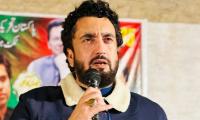Says Imran to remain PTI founder if not chairman
ISLAMABAD: Senior leader of Pakistan Tehreek-e-Insaf (PTI) and former head of party’s election commission Justice (R) Wajihuddin Ahmad has responded to four important questions being raised by some PTI leaders and some critics in media.
Following are the questions and their answers by Justice Wajihuddin.
Q: Is it true that the Election Tribunal (ET) exceeded its terms of reference, having sent all the PTI office bearers/organisations packing even though the ET had been confined to the party election (2013) in Sindh only?
A: At the outset, it was only the Sindh matters. At that time the ET had not yet been constituted. Since the discussion then was with Wajihuddin Ahmed alone, he declined to accept the responsibility of the Tribunal as a Sindh specific tribunal would have smacked of unequal treatment and mala fide. This arose because the election grievances were country-wide and not confined to Sindh. In such background, all 76 pending election petitions were forwarded to the ET. The petitions were examined. Notices were forwarded to all concerned. A synopsis of the petitions was also prepared. Because the overall material revealed deviations, improprieties and illegalities throughout the country (during the IPE), the ET proceeded to dispose of all the said petitions, which had a country wide impact.
Q: Why no action was taken against Hamid Khan, head of the PTI Election Commission, 2013?
A: No occasion as such arose for any action against the members of the then Election Commission (EC), Hamid Khan being its chairman and Rauf Hassan its secretary. In Pakistan, it was the first exercise of its kind and had to cater to a huge electorate. Throughout the IPE period, the EC members, incessantly in session, worked on an electronic mode of voting. In the ultimate trial, the system did not satisfactorily work. EC, mid stream, had to revert to the conventional method of voting. Due time for the switch over was not allowed, as the chairman wanted to have all elected bodies in place by March 23, 2013. All this compounded for the vested interest and status quo forces to have a field day. No wrong doing on the part of the EC, except at an intermediary level, was identified. Such deviations were left by the ET for SCAD (Standing Committee on Accountability and Discipline) to address. As luck would have it, SCAD itself was shown the door by the entrenched elements. Anyway, the ET has revived the SCAD, which is fully capable of various and ever evolving, transgressions of law, the party Constitution and its own and ET orders. As it is, in spite of serious wrong doing on the part of some candidates, it was found advisable to adopt a non-controversial and constructive course. None was branded. Only the term of office of the various bodies/persons was curtailed from four (4) to two (2) years. Fresh elections, with a clean slate, were called. Action even against the likes of Pervaiz Khattak, Jehangir Khan Tarin, Aleem Khan and Nadir Akmal Leghari came about after the final operative orders. This transpired, in due course of time, when evidence of rigging against the entrenched elements surfaced and went unrebutted.
Q: Why did the ET confer almost monarchical powers on PTI Chairman Imran Khan?
A: It is incorrect that the ET conferred unbridled absolute powers on the incumbent PTI chairman. Like others, he too could have suffered a curtailed tenure. (Indeed contrary to as claimed, getting elected unopposed may not give you a clean chit since, for the most part, in other Pakistan political parties, elections are reported to be unopposed and without contest.) But that would have left us party-less. He therefore was continued as reflected below.
The Chairman’s assumption of absolute powers was subsequent when, as MS Shafique has correctly pointed out, there was only selected compliance of the ET Orders (which, by the status quo elements, have been treated as only ET recommendations and not orders). This approach, ultimately, swept aside also the successor EC and the lately unfolded IPE itself. Everyone, the ET and the EC, allegedly, acted in excess of and beyond authority, except the status quo elements, which, through the chairman, still rule the roost!
Q: Why does not the ET come out of its self-imposed hibernation and enforce the ET orders?
In the face of perennial non-compliance of ET orders, ET activation is bound to lead to irreversible confront action, which needs to be avoided. On the other hand, there appears to be an ET meeting with the members of the SCAD and the EC. Hopefully, a way may be worked out. All the forging is borne out by the record. For reasons of brevity, only the following (and not the umpteen others) may please be seen:
Excerpts from the ET Order dated 17-10-2014:
7) “In this scenario, the Tribunal had two options: either to set aside the faulty elections and allow the vacancies, thus occurring, to be supplied by nominations to be followed by re-elections, an exercise which, in other contexts, has failed, vested interests having procrastinated the logical by-elections.Consequently, ground realities reveal a totally nominated body in Baluchistan, nominated President and General Secretary in KPK, a nominated President in Karachi, a nominated Secretary General at the centre etc.
8) The other alternative with the Tribunal was to curtail the existing term of office of four years to two years.
9) The Tribunal has gone for the said second option.
10) The report of the Tasneem Noorani Commission (comprising Mr. Tasneem Noorani, Mr.Ahmed Awais and Mr. Yaqoob Izhar), exhaustively covering the entire gamit of the Intra Party Elections of 2013, has also found the same or similar irregularities and recommended re-election in not too distant a future. The PTI Constitution Review Commission (consisting of M/s Ali Asghar Khan, Arif Alvi, Hamid Khan, Imran Ismail, Ishaq Khakwani, Mian Mehmood Ur Rasheed, Munaza Hassan, Najeeb Haroon, Naz Baloch, NazarBaloch, SaifUllah Khan Niazi, Salman Afridi Barrister, Saloni Bukhari, Sardar Khadim Hussain Wardak, ShafqatMehmood, ShahidZulfiqar Air Marshal, Shamsa Ali, Shireen Mazari, Tasneem Noorani, Wajih Uddin Ahmed, Justice (R) Walid Iqbal and Yasmeen Rashid), headed by one of us namely, Wajihuddin Ahmed, as to the tenure of the Party Office bearers, has proposed a two year term and suggested constitution amendments accordingly. Unfortunately, the reviewed version of the PTI Constitution remains to be placed before the PTI National Council for approval. Be that as it may, this being an exercise of quasi-judicial power, irrespective of constitution amendments, the Tribunal, in the face of wide spread wrong doing in the party elections, has decided to curtail the current electoral terms of the PTI office bearers and cut short their tenures to two years, followed by Intra Party Elections before the efflux of such curtailed two years. The Constitution Review, if any, would cover the future terms, which may be, as the amended or unamended Constitution may say.”
13) “As a result, the current term of the party office bearers shall expire on March 18, 2015, and new party office bearers shall be in place by that date, to be inducted accordingly. Thus there would be a period of good five months to prepare for and hold free, fair and meaningful party elections.
14) Steps would immediately be taken to update the membership in terms of the PTI Constitution, to re-activate the Party Election Commission and, at the same time, as far may be, to hold by-elections for all offices that may be awaiting elected office bearers.
15) This order would not come in the way of any disciplinary action, at any level, against all or any of the party office bearers, found to have exposed themselves to such action.”
Reproduced from the ET Order dated 18-3-2015: “The referred term of the party office bearers thus stands expired as of today and they are no longer in office. Also gone with them are the Core Committee (CC) and the Central Executive Committee (CEC) of each of which one of us is an ex officio member.
Unfortunately and for mala fide reasons, so far, new office bearers are not in place, only because elections for their induction have not been held. This, therefore, is a case for introduction of caretakers however much we may be inclined to shun nominations. At times, bitter pills have to be swallowed in order to get well.
The only office bearer whom we need not touch is the incumbent of the office of Chairman, PTI. Even if Mr. Imran Khan was not the Chairman of the party, his status, being that of the founder, is no less for the PTI than that of Mr Jinnah to the All India Muslim League or of ZA Bhutto to the PPP or of Sheikh Mujeeb Ur Rehman to the Awami League or of Abul Ala Maudoodi to the Jamaat-e- Islami.
Correspondingly, the office bearers of the PTI wings also would remain unaffected for two reasons: a) they have not yet been brought under the ambit of the PTI Constitution and b) because their electoral process being intermixed with the main party elections, confers upon them a peculiar status.
Accordingly, we are constrained to entrust the following to Chairman Imran Khan:
a. Appoint caretakers at all levels of the party in such manner that the care-takers, running the interim administration and putting the elected office bearers in place upon due party elections being organized, shall themselves not be eligible for the IPE transpiring under their watch. The disability would continue even if any such caretaker, having once been inducted, subsequently, takes recourse to the device of resignation. The chairman himself would be exempt totally and so also the caretakers in so far as provincial, national or other elections under the Pakistan Constitution. Members of the Central Election Commission, or those below them, would also be subject to similar disabilities as the caretakers.
b. Nominate the Central Election Commission under a Chief Election Commissioner, the Commission’s tasks being: To constitute a committee or substitute or remodel the existing technical committee to finalize the party voters’ list, following the same criteria, but obviously more scrupulously applied, as was in operation during the last party elections. No constraints on membership, then non-existent, shall be imposed now. The electoral lists shall be completed within a month’s time.
ii. Hold the Intra Party Elections within a period of 3 months in such manner that the new office bearers stand elected within that period of 3 months.
iii. Assist the Chairman in completing the Central Executive Committee (CEC) and the National Council within 15 days of the culmination of the Intra Party Elections.
We have identified serious wrong-doings in our Order dated 17-10-2014. The Standing Committee on Accountability and Discipline (SCAD) would be entrusted by those concerned, including the Chairman, with such deviations. The SCAD would decide these matters within a period of 3 months.
Where wrong-doers are encountered, the Central Election Commission may disqualify them or any of them from the Intra Party Elections. Likewise, the Parliamentary Boards or the Scrutiny Committee may not entertain such elements for local, provincial or National elections.”
“It is axiomatic that passing orders at any level may turn out to be fruitless unless the orders are attended by an implementation mechanism. Thus unless we had imposed an outer date in our Order dated 17-10-2014, matters would have tarried on, with no prospect of reining them in. Acting on this principle, we require all concerned to make fortnightly reports to us of the progress each functionary is required to make.
Yusuf Malik Gabol, Wajihuddin Ahmed
Kasuri urged authorities of Pakistan and China to pull their resources to defeat forces seeking to disrupt the...
IHC said that several people had not returned the cipher copies they had, and asked if it meant it was right for the...
Gilani gave floor to Leader of Opposition Syed Shibli Faraz, who insisted that with unity they could take country...
Match witnessed intense action and dramatic twists, keeping fans on the edge of their seats until the final ball
Apex court bench was reconstituted after Justice Yahya Afridi recused himself from hearing the case earlier this month
ECP issued a notification in this connection pursuant to orders passed by LHC







